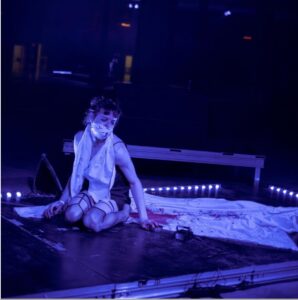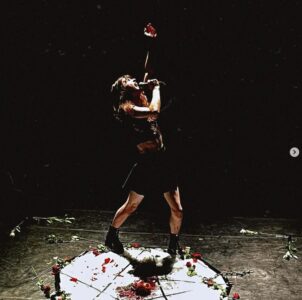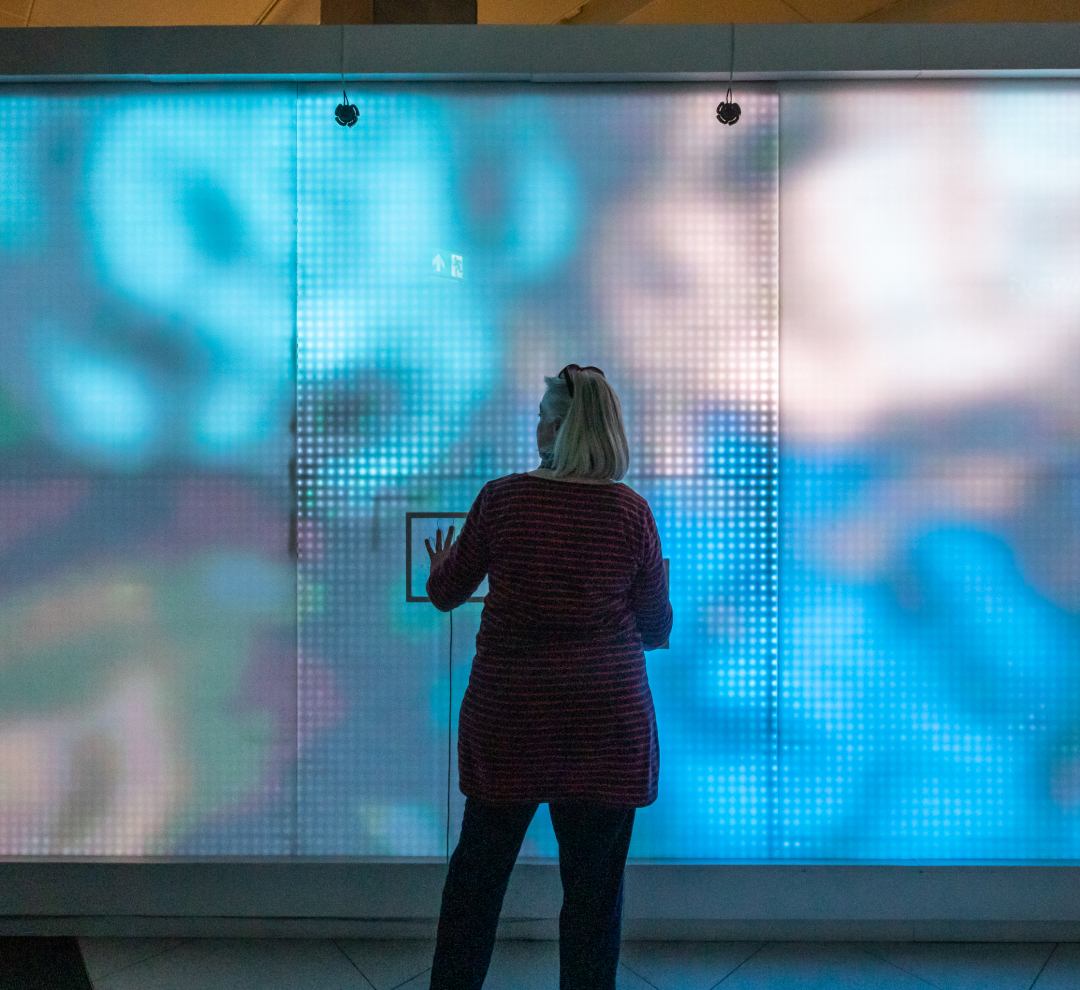Callie Rose Petal is a conceptual artist and experimental musician who works under the moniker ‘lonely carp’. As a disabled trans* woman, she centres her experience with chronic illness and how this has placed complex barriers to medical transition, using this as a springboard for criticising transmedicalist ideology. Callie is a classically trained pianist, multi-instrumentalist and sound artist, with a live performance history dating back to 2014.
In her core creative practice, Callie works with hard-hitting concepts that are inescapably political due to her own existence being politicised, and she creates live and noise works which attack the canonical norms of creative practice.
Callie received formal education in bioinformatics from the Roslin Institute at the University of Edinburgh, before pivoting to focus solely on her creative work. She now synergises her artistic practice and her fight for social acceptance but was excited to explore, through Creative Informatics how her own creative practice could be more informed by the data science work she had previously trained in, and how data driven work could inform or drive her activist works.
Callie applied to become a Resident Entrepreneur to support the development of her idea for an interactive, web-based listening platform based on statistics around the LGBTQ+ community organised into a decision tree, that hybridises the music and gaming industries, by providing an individualised listening experience that reacts to user inputs.

Image: Callie Rose Petal performing as lonelycarp
Originally, in its first iteration, the platform would ask the user a series of 6 binary questions of increasing vulnerability, each accompanied by a related statistic affecting the LGBTQ+ community and a 20-second-long section of the music. This would lead to 64 different possible song outcomes. Each one 2 minutes in length, individualised to the user’s decisions. The work would engage the listener intensely and creates a personalised, community bridging experience that heretofore has been unattainable in music.
Intended to complete towards the end of 2021, the timeline for this project was extended several times to support Callie with significant life developments, including her ongoing lived experience of transition, and her pivot into a new career.
Creative Informatics have found that flexibility with timescales is essential for those with protected characteristics, who are often dealing with more complex life situations and demands than others. In Callie and some other participant’s cases, some of these complexities are inextricably linked to the protected characteristics that make their creative work so distinctive. Compassionate understanding of these more complex needs, strong and empathetic communication, and consideration of special circumstances when setting delivery timeframes, is a critical support element in allowing the greatest diversity of partners and projects. Attempting to make all R&D projects work to a stringent delivery schedule would mean much of the most radically inclusive projects may never come to full fruition, disadvantaging not just artists and entrepreneurs, but also the marginalised communities of which they are part, and seek to support themselves, as well as the wider culture and market who would otherwise be denied access to more diverse ideas and voices.
In Callie’s case, these delays resulted in unanticipated positive developments to both her product proposition, as well as her personal career trajectory.

Image: Callie Rose Petal performing as lonelycarp
Through Creative Bridge, Callie developed valuable business skills and acumen, which she later applied to strengthen her creative endeavours. This experience was instrumental in shaping the trajectory of the project and its ultimate outcomes. One of the notable achievements was the creation of her artist website, a project that helped streamline and organize her various artistic endeavours, serving not only served as a platform to showcase her work but also facilitate better organisation and presentation of her multifaceted art projects.
As a Resident Entrepreneur, a fundamental goal of Callie’s project was to enhance her programming skills, an objective which was undeniably achieved. Leveraging regional retraining opportunities in parallel to her Creative Informatics work, Callie’s programming abilities saw exponential growth, which opened up exciting opportunities in her professional life. As a direct result of these improved skills, Callie secured a position as a Software Engineer with Accenture, providing her with a stable income that gives her the breathing space to continue to pursue her creative work. This employment not only allowed Callie to sustain herself but also provides the means to continue the development of the web app project during her spare hours. This dual pursuit of art and programming has only been made possible by the skills Callie gained during her tenure as a Resident Entrepreneur.
“My experience as a Resident Entrepreneur has been an immensely transformative and fruitful journey that has significantly impacted both my artistic practice and career trajectory.” – Callie Rose Petal
Additionally, her Resident Entrepreneurship provided Callie with the space and resources to delve deeper into the live art aspect of her work, combined with musical compositions, resulting in a more refined and distinctive artistic aesthetic, and arrangement skills developed during the project, and led to the composition of scores for a documentary about Callie’s life and work. This documentary, ‘What it Means to Be’ directed by Lea Luiz de Oliveira, entered the festival circuit and achieved recognition, including winning the Best Short Documentary award at the Mumbai Queer Film Festival. It has been screened in multiple locations worldwide, sparking heartwarming discussions and testimonials during the Q&As from members of the LGBTQ+ community positively impacted by the film’s message.
Finally, the adjusted timeline allowed Callie to more fully consider the project’s practical considerations and funding constraints, leading to a shift in the project’s modality, evolving from a product-focused initiative to a self-development journey as an artist-engineer. The animation component became unmanageable due to resource limitations, prompting a transition to a purely musical project.
As Callie’s knowledge of app development expanded and following her full-time employment as a software developer, Callie came to realise that the immense scope of work involved was unfeasible for a single developer. This prompted a shift in the technology stack, a simplification of the project proposition, and the inclusion of AI into the content delivery to both ameliorate workload and provide users with a truly unique outcome. The thematic direction of the project was also shaped by personal events, and it was dedicated to the memory of a friend. The web app version of the MVP is due for public release in late 2024, supported by outreach and marketing campaigns.
Callie’s residency not only equipped her with essential business skills but also facilitated personal and artistic growth. Despite unexpected changes to the original proposal, her project yielded positive outcomes, including international recognition, festival performances, and a refined artistic aesthetic. These experiences have not only enriched Callie’s artistic practice but have also opened doors to new opportunities and collaborations.

